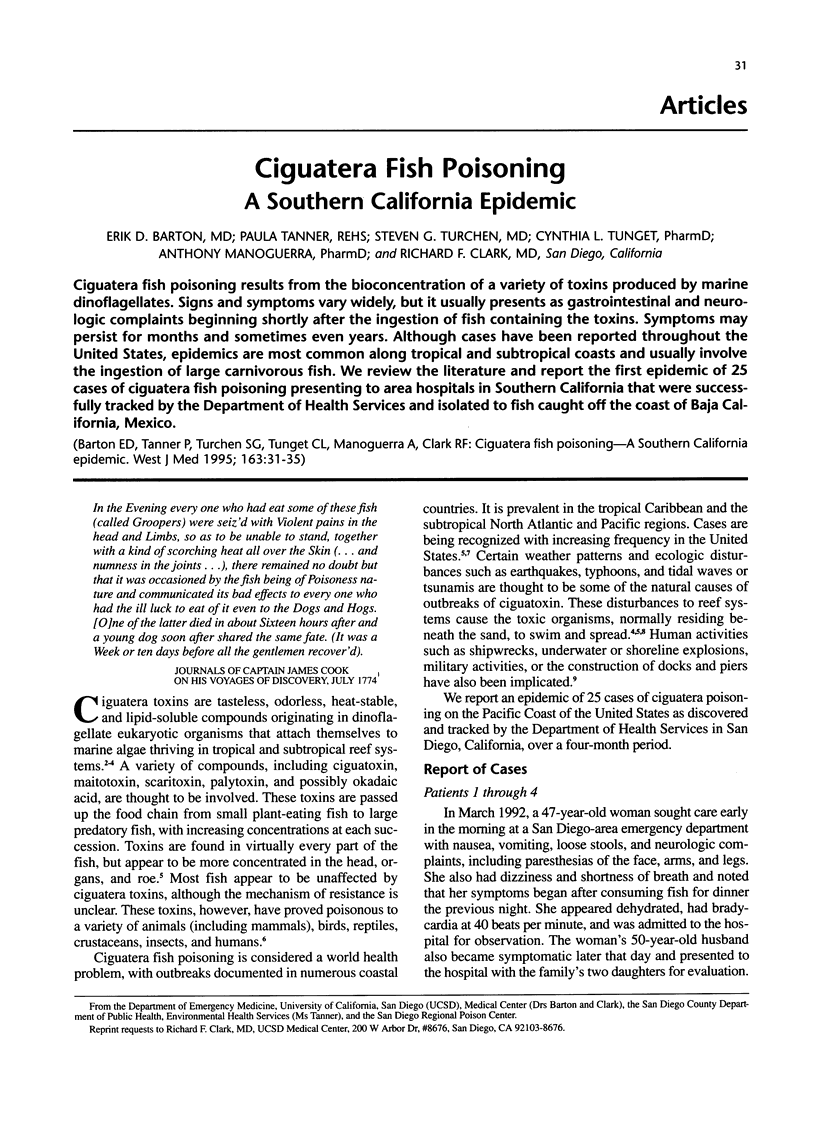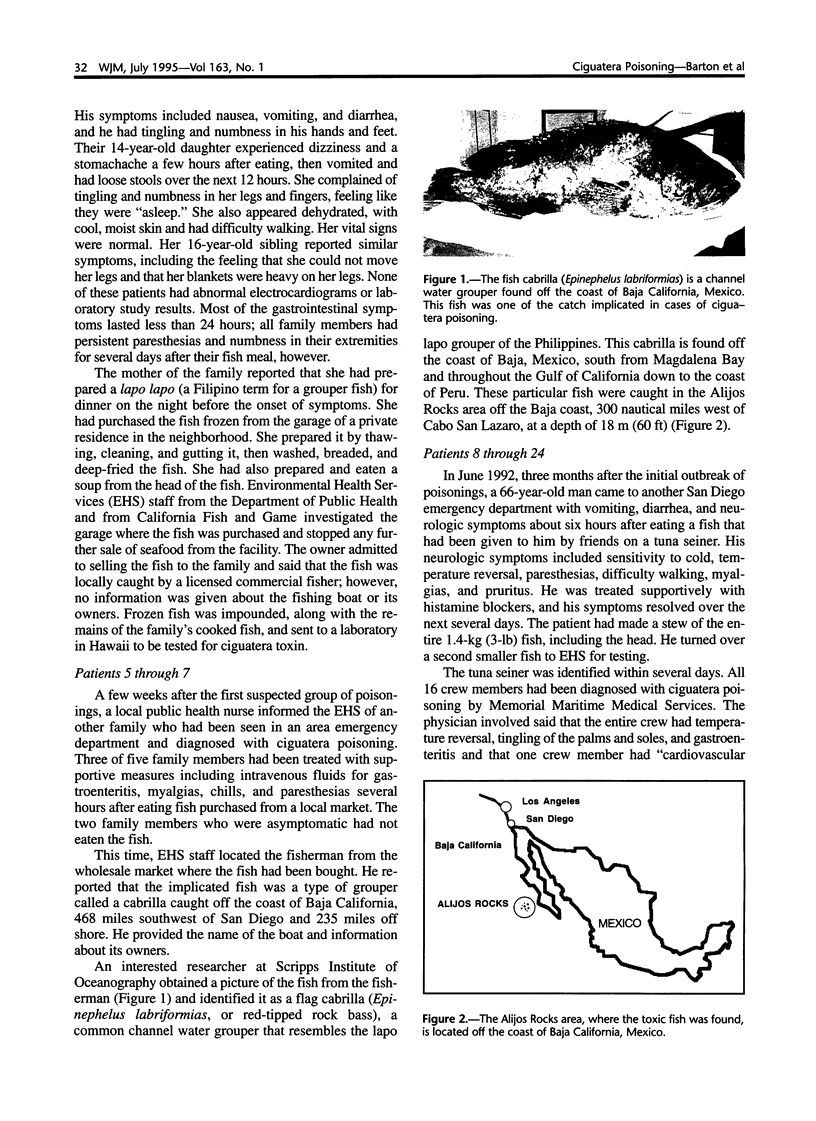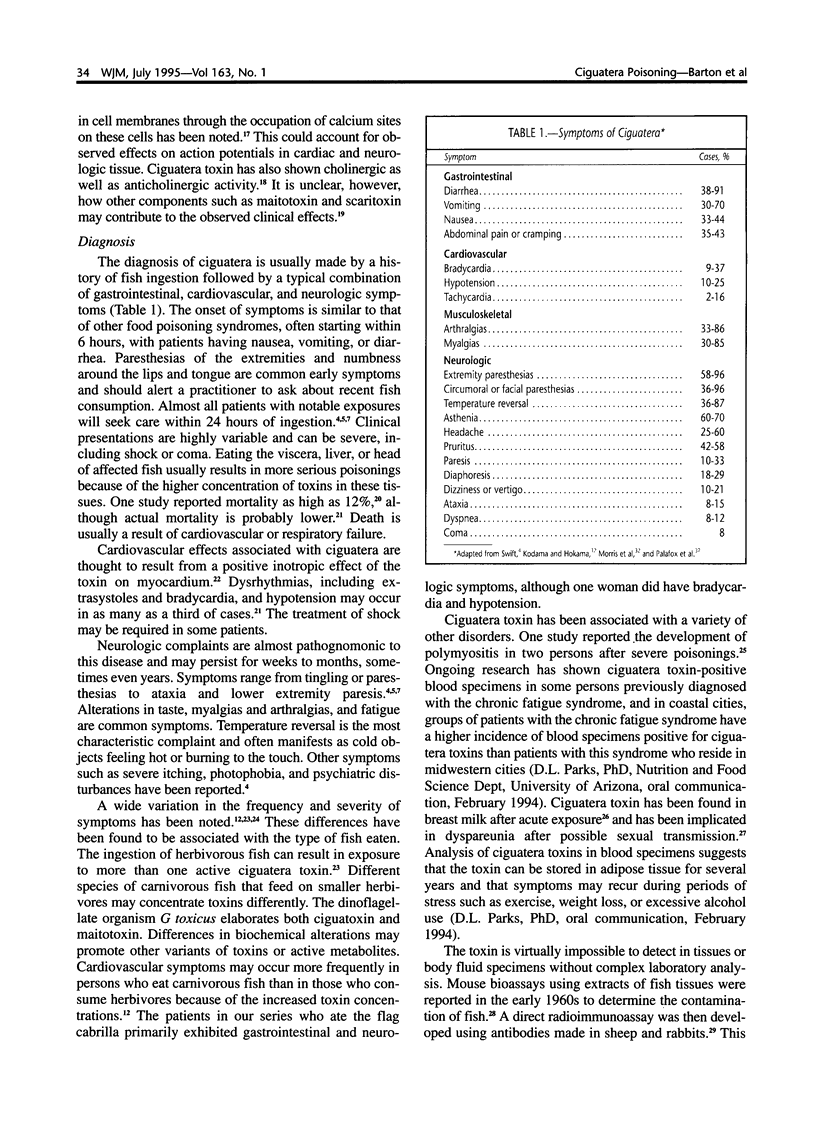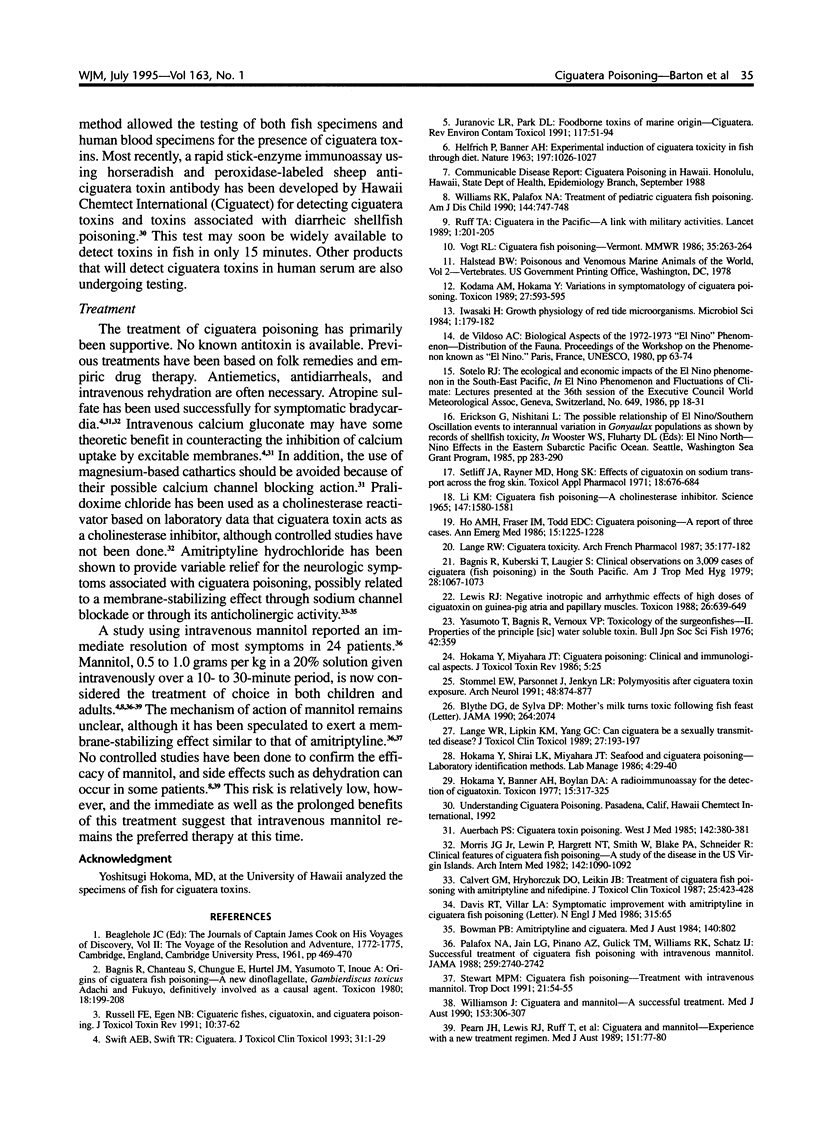Abstract
Ciguatera fish poisoning results from the bioconcentration of a variety of toxins produced by marine dinoflagellates. Signs and symptoms vary widely, but it usually presents as gastrointestinal and neurologic complaints beginning shortly after the ingestion of fish containing the toxins. Symptoms may persist for months and sometimes even years. Although cases have been reported throughout the United States, epidemics are most common along tropical and subtropical coasts and usually involve the ingestion of large carnivorous fish. We review the literature and report the first epidemic of 25 cases of ciguatera fish poisoning presenting to area hospitals in Southern California that were successfully tracked by the Department of Health Services and isolated to fish caught off the coast of Baja California, Mexico.
Full text
PDF




Images in this article
Selected References
These references are in PubMed. This may not be the complete list of references from this article.
- Auerbach P. S. Emergency medicine: ciguatera toxin poisoning. West J Med. 1985 Mar;142(3):380–381. [PMC free article] [PubMed] [Google Scholar]
- Bagnis R., Chanteau S., Chungue E., Hurtel J. M., Yasumoto T., Inoue A. Origins of ciguatera fish poisoning: a new dinoflagellate, Gambierdiscus toxicus Adachi and Fukuyo, definitively involved as a causal agent. Toxicon. 1980;18(2):199–208. doi: 10.1016/0041-0101(80)90074-4. [DOI] [PubMed] [Google Scholar]
- Bagnis R., Kuberski T., Laugier S. Clinical observations on 3,009 cases of ciguatera (fish poisoning) in the South Pacific. Am J Trop Med Hyg. 1979 Nov;28(6):1067–1073. doi: 10.4269/ajtmh.1979.28.1067. [DOI] [PubMed] [Google Scholar]
- Blythe D. G., de Sylva D. P. Mother's milk turns toxic following fish feast. JAMA. 1990 Oct 24;264(16):2074–2074. doi: 10.1001/jama.264.16.2074b. [DOI] [PubMed] [Google Scholar]
- Bowman P. B. Amitriptyline and ciguatera. Med J Aust. 1984 Jun 23;140(13):802–802. doi: 10.5694/j.1326-5377.1984.tb132642.x. [DOI] [PubMed] [Google Scholar]
- Calvert G. M., Hryhorczuk D. O., Leikin J. B. Treatment of ciguatera fish poisoning with amitriptyline and nifedipine. J Toxicol Clin Toxicol. 1987;25(5):423–428. doi: 10.3109/15563658708992645. [DOI] [PubMed] [Google Scholar]
- Centers for Disease Control (CDC) Ciguatera fish poisoning--Vermont. MMWR Morb Mortal Wkly Rep. 1986 Apr 25;35(16):263–264. [PubMed] [Google Scholar]
- Davis R. T., Villar L. A. Symptomatic improvement with amitriptyline in ciguatera fish poisoning. N Engl J Med. 1986 Jul 3;315(1):65–65. [PubMed] [Google Scholar]
- Ho A. M., Fraser I. M., Todd E. C. Ciguatera poisoning: a report of three cases. Ann Emerg Med. 1986 Oct;15(10):1225–1228. doi: 10.1016/s0196-0644(86)80873-3. [DOI] [PubMed] [Google Scholar]
- Hokama Y., Banner A. H., Boylan D. B. A radioimmunoassay for the detection of ciguatoxin. Toxicon. 1977;15(4):317–325. doi: 10.1016/0041-0101(77)90014-9. [DOI] [PubMed] [Google Scholar]
- Iwasaki H. Growth physiology of red-tide microorganisms. Microbiol Sci. 1984 Oct;1(7):179–182. [PubMed] [Google Scholar]
- Juranovic L. R., Park D. L. Foodborne toxins of marine origin: ciguatera. Rev Environ Contam Toxicol. 1991;117:51–94. doi: 10.1007/978-1-4612-3054-0_2. [DOI] [PubMed] [Google Scholar]
- Kodama A. M., Hokama Y. Variations in symptomatology of ciguatera poisoning. Toxicon. 1989;27(5):593–595. doi: 10.1016/0041-0101(89)90121-9. [DOI] [PubMed] [Google Scholar]
- LI K. M. CIGUATERA FISH POISON: A CHOLINESTERASE INHIBITOR. Science. 1965 Mar 26;147(3665):1580–1581. doi: 10.1126/science.147.3665.1580. [DOI] [PubMed] [Google Scholar]
- Lange W. R. Ciguatera toxicity. Am Fam Physician. 1987 Apr;35(4):177–182. [PubMed] [Google Scholar]
- Lange W. R., Lipkin K. M., Yang G. C. Can ciguatera be a sexually transmitted disease? J Toxicol Clin Toxicol. 1989;27(3):193–197. doi: 10.3109/15563658909038583. [DOI] [PubMed] [Google Scholar]
- Lewis R. J. Negative inotropic and arrhythmic effects of high doses of ciguatoxin on guinea-pig atria and papillary muscles. Toxicon. 1988;26(7):639–649. doi: 10.1016/0041-0101(88)90246-2. [DOI] [PubMed] [Google Scholar]
- Morris J. G., Jr, Lewin P., Hargrett N. T., Smith C. W., Blake P. A., Schneider R. Clinical features of ciguatera fish poisoning: a study of the disease in the US Virgin Islands. Arch Intern Med. 1982 Jun;142(6):1090–1092. [PubMed] [Google Scholar]
- Palafox N. A., Jain L. G., Pinano A. Z., Gulick T. M., Williams R. K., Schatz I. J. Successful treatment of ciguatera fish poisoning with intravenous mannitol. JAMA. 1988 May 13;259(18):2740–2742. [PubMed] [Google Scholar]
- Pearn J. H., Lewis R. J., Ruff T., Tait M., Quinn J., Murtha W., King G., Mallett A., Gillespie N. C. Ciguatera and mannitol: experience with a new treatment regimen. Med J Aust. 1989 Jul 17;151(2):77–80. doi: 10.5694/j.1326-5377.1989.tb101165.x. [DOI] [PubMed] [Google Scholar]
- Ruff T. A. Ciguatera in the Pacific: a link with military activities. Lancet. 1989 Jan 28;1(8631):201–205. doi: 10.1016/s0140-6736(89)91212-9. [DOI] [PubMed] [Google Scholar]
- Setliff J. A., Rayner M. D., Hong S. K. Effect of ciguatoxin on sodium transport across the frog skin. Toxicol Appl Pharmacol. 1971 Mar;18(3):676–684. doi: 10.1016/s0041-008x(71)80022-4. [DOI] [PubMed] [Google Scholar]
- Stewart M. P. Ciguatera fish poisoning: treatment with intravenous mannitol. Trop Doct. 1991 Apr;21(2):54–55. doi: 10.1177/004947559102100204. [DOI] [PubMed] [Google Scholar]
- Stommel E. W., Parsonnet J., Jenkyn L. R. Polymyositis after ciguatera toxin exposure. Arch Neurol. 1991 Aug;48(8):874–877. doi: 10.1001/archneur.1991.00530200116031. [DOI] [PubMed] [Google Scholar]
- Swift A. E., Swift T. R. Ciguatera. J Toxicol Clin Toxicol. 1993;31(1):1–29. doi: 10.3109/15563659309000371. [DOI] [PubMed] [Google Scholar]
- Williams R. K., Palafox N. A. Treatment of pediatric ciguatera fish poisoning. Am J Dis Child. 1990 Jul;144(7):747–748. doi: 10.1001/archpedi.1990.02150310013007. [DOI] [PubMed] [Google Scholar]
- Williamson J. Ciguatera and mannitol: a successful treatment. Med J Aust. 1990 Sep 3;153(5):306–307. doi: 10.5694/j.1326-5377.1990.tb136931.x. [DOI] [PubMed] [Google Scholar]




